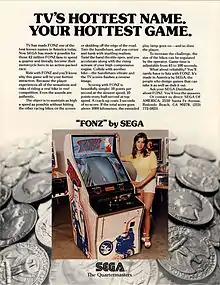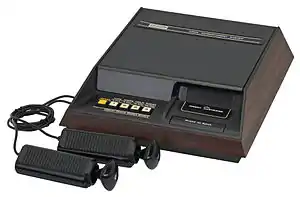1970s in video games
The 1970s was the first decade in the industry's history. The 1970s saw the development of some of the earliest video games, chiefly in arcade versions, but also several for the personal computer and the earliest video game consoles.
| 1960s . 1970s in video games . 1980s |
| Other events: 1970s . Games timeline |

Consoles of the 1970s
First generation consoles
The so-called first generation of consoles were on sale between 1972 and 1980 and included the Magnavox Odyssey, Telstar, Home Pong and Color TV-Game.
Typical characteristics of the first generation of consoles:
- Discrete transistor-based digital game logic.
- Games were native components of consoles rather than based on external or removable media.
- Entire game playfield occupies only one screen.
- Players and objects consist of very basic lines, dots or blocks.
- Colour graphics are basic (mostly black and white or other dichromatic combination; later games may display three or more colours).
- Either single-channel or no audio.
- Lacked features of second generation consoles, such as microprocessor logic, ROM cartridges, flip-screen playfields, sprite-based graphics, and multi-color graphics.
Second generation consoles 1976–1983


The second generation of consoles, on sale between 1976 and 1988, made several leaps forward technologically. Consoles first available in the late 1970s included the Fairchild Channel F, Atari 2600, Bally Astrocade and Magnavox Odyssey². The first handheld console, the Microvision, was released in 1979.
Typical characteristics of the second generation of consoles:
- Microprocessor-based game logic.
- AI simulation of computer-based opponents, allowing for single-player gaming.
- ROM cartridges for storing games, allowing any number of different games to be played on one console.
- Game playfields able to span multiple flip-screen areas.
- Blocky and simplistic-looking sprites, with a screen resolution of around 160 × 192 pixels.
- Basic color graphics, generally between 2-color (1-bit) and 16-color (4-bit).
- Up to three channel audio.
- Lacked features of third-generation consoles, such as scrolling tile-based playfields.
History
Golden age of arcade games
Classic arcade games of the 1970s include Space Invaders (1978), Space Race (1973), Speed Race (1974), Gun Fight (1975), Fonz (1976), Night Driver (1976), Breakout (1976), Death Race (1976), Space Wars (1977), Barrier (1979), Speed Freak (1979), Warrior (1979), Tail Gunner (1979), Galaxian (1979), Lunar Lander (1979) and Asteroids (1979).
Notable video-game franchises established in the 1970s
Arcade
- Asteroids (1979)
- Breakout (1976)
- Circus (1977)
- Depthcharge (1977)
- Galaxian (1979)
- Gun Fight (1975)
- Heavyweight Champ (1976)
- Pong (1972)
- Space Invaders (1978)
- Space (1979)
- Sprint (1976)
- Stunt Cycle (1976)
- Superman1 (1978)
- Tank (1974)
Home computers and console
- Battlestar Galactica1 (1978)
- Empire (1977)
- Combat (1977)
- dnd (1974)
- Flight Simulator (1979)
- Hunt the Wumpus (1973)
- Lunar Lander (1973)
- MUD (1978)
- The Oregon Trail (1971)
- Sargon (1978)
- Spasim (1974)
- Star Raiders (1979)
- Star Trek1 (1971)
- Zork (1977)
Notes:
- 1Game franchises that also accompany major film or television franchises.
